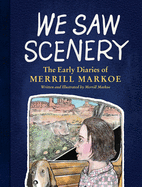 The closing program for New Voices, New Rooms, "The Way Forward: Meeting Crisis with Creativity," felt a bit like sitting in a living room with the three authors featured: Ann Patchett (The Dutch House, Harper), with her self-described "Amish look" hair pulled back, silkscreen flowers on the wallpaper; Glennon Doyle (Untamed, Dial), with her poster "We Can Do Hard Things" (more about that in a moment) behind her, and a 64-oz. water bottle that had the chat box all aflutter; and Elizabeth Gilbert (City of Girls, Riverhead), who'd just been for a swim, and confiscated a neighbor's dog for the evening.
The closing program for New Voices, New Rooms, "The Way Forward: Meeting Crisis with Creativity," felt a bit like sitting in a living room with the three authors featured: Ann Patchett (The Dutch House, Harper), with her self-described "Amish look" hair pulled back, silkscreen flowers on the wallpaper; Glennon Doyle (Untamed, Dial), with her poster "We Can Do Hard Things" (more about that in a moment) behind her, and a 64-oz. water bottle that had the chat box all aflutter; and Elizabeth Gilbert (City of Girls, Riverhead), who'd just been for a swim, and confiscated a neighbor's dog for the evening.
Linda-Marie Barrett, executive director of the Southern Independent Booksellers Alliance, introduced the three authors after thanking Eileen Dengler, executive director of the New Atlantic Independent Booksellers Association, who together with Barrett planned the programming for New Voices, New Rooms. "NVNR was our creative response to crisis," said Barrett. "Pandemic, civil unrest and natural disasters. People will never forget that Amazon de-prioritized books, but that booksellers rose to it whether from their living rooms or the floors of their stores. Let's raise a glass to independent booksellers." Barrett said that a strong closing asks us to "look inward so we can turn outward" and said Patchett, Doyle and Gilbert with the authors who could help do just that.
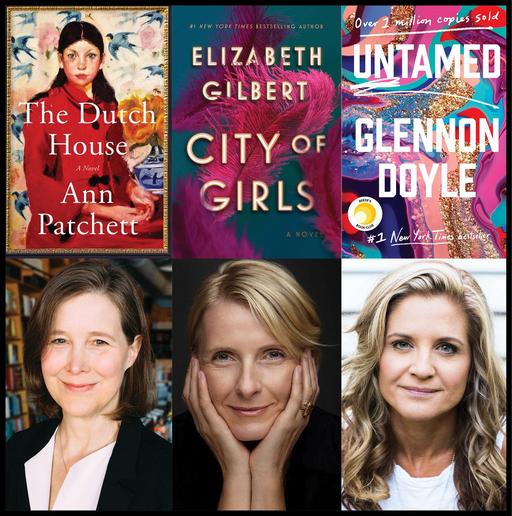 Patchett asked, "How are you getting creatively through crisis?" Doyle replied, "My event with Ann during my book launch was my very last book tour event. I went from this time when I was supposed to be launching this big thing in the world, to Covid. I remember my sister bawling and saying, 'what we can do?' And I said, 'We can do service.' Now I'm doing everything in my power to affect the election. Today, we launched 'We Can Do Hard Things: 40 Days of Outrage to Action'--I'm trying to learn democracy and teach it to people." Patchett recommends Thank You for Voting by Erin Geiger Smith: "Its great strength is that it's tiny. The history of voting, such a great civics lesson. There's a young readers edition, too."
Patchett asked, "How are you getting creatively through crisis?" Doyle replied, "My event with Ann during my book launch was my very last book tour event. I went from this time when I was supposed to be launching this big thing in the world, to Covid. I remember my sister bawling and saying, 'what we can do?' And I said, 'We can do service.' Now I'm doing everything in my power to affect the election. Today, we launched 'We Can Do Hard Things: 40 Days of Outrage to Action'--I'm trying to learn democracy and teach it to people." Patchett recommends Thank You for Voting by Erin Geiger Smith: "Its great strength is that it's tiny. The history of voting, such a great civics lesson. There's a young readers edition, too."
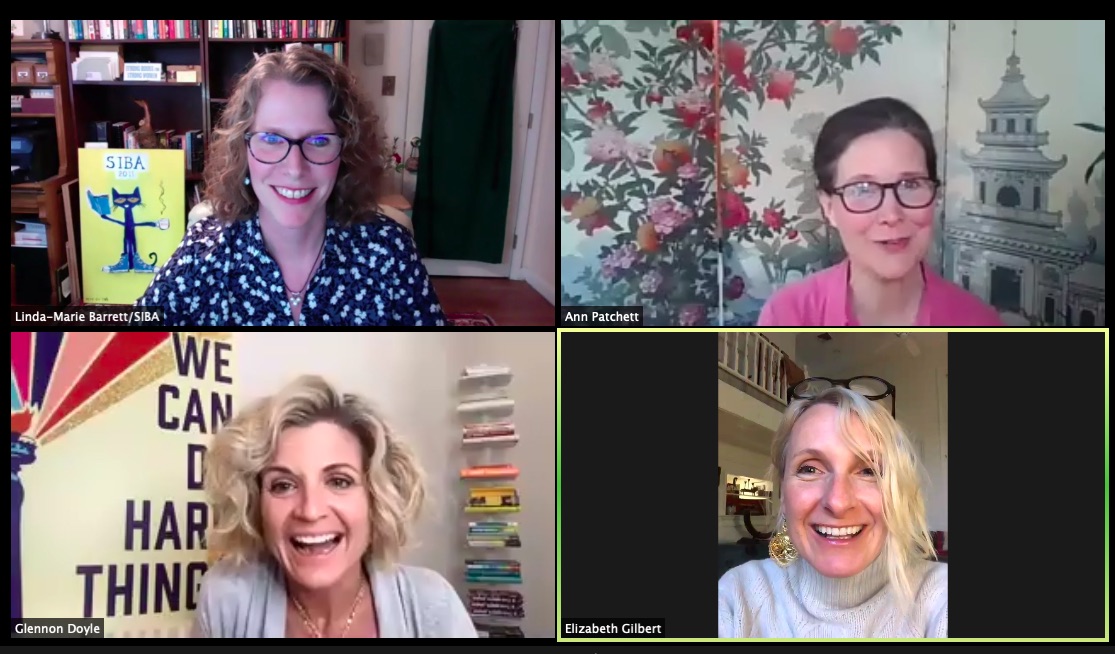 |
| Clockwise from top left: Linda-Marie Barrett, Ann Patchett, Elizabeth Gilbert, Glennon Doyle |
It quickly became clear that the three authors are also friends. "I follow Glennon," Gilbert said. "I look to you in times of crisis for guidance--what's the way we can react, on a personal level and then the public civic level." On a personal level, Gilbert spoke of the importance of "keeping your sanity, stillness, perspective, wisdom." Gilbert said, "When this started, I thought this will be a marathon, not a sprint. That was even before 2020 said, 'Here, hold my beer, let me show you what else I can do.' I haven't done this much spiritual work since I was living in India in an ashram," she said. "Part of my job as a public servant is to demonstrate spiritual practice. The other thing I'm doing is picking up the torch [that began on June 10] with #ShareTheMicNow. Fifty white women with large platforms turned it over to African American women. I thought it shouldn't be an event what happens once, but every day that you can."
Doyle agreed that staying sane is a very important part of this period. "I am a person who has dealt with depression and anxiety my whole life," she said. "Several months into the pandemic, Abby [Wambach, Doyle's partner] said, 'You're so calm!' I was talking with friends who share a similar outlook who were experiencing the same. Our whole life we've been living on a Level 9 and now the whole world has met us here!"
Patchett pursued the point about maintaining one's sanity. "I want to take it one step further which is maintaining my joy," Patchett said. I have a very level personality and I am naturally inclined toward joy. I have a great relationship, house, dog, family nearby, the store, and work I do from home anyway. I can't give in to the bog beneath me. I'm not on any social media and I don't have a cell phone."
"You're all over social media!" Gilbert broke in, "Parnassus makes videos of you, and I know--because you're my friend--that you never watch them!" Patchett bemoaned the fact that she interviewed fellow author and bookstore owner Louise Erdrich with 35,00 people watching them live, and 5,000 people watching it afterward, "and it didn't move books! If I talk about a book while wearing a cocktail dress, people do [buy them]!" Patchett was speaking about her attire for her Nashville store's Tuesday laydown video. For her, it's about keeping the store going, "keeping the people in the store who are my beloveds employed. Putting as much creativity into selling books as I can." Patchett said that she and her business partner, Karen Hayes, didn't feel good about how much they were making from antiracist books, so they donated it all to Gideon's Army, a Black-owned and -operated organization "that makes Nashville a better place."
Barrett returned to the conversation to ask questions posed by the virtual audience. First up, book recommendations. Patchett dove in first with Transcendent Kingdom by Yaa Gyasi and Alice Randall's Black Bottom Saints. Doyle said. "I'm reading The Fire Next Time right now. I thought James Baldwin's writing would be up here [pointing above her head], but it's all guts and heart." Patchett responded, "Read Giovanni's Room, just to give yourself dessert. It's the James Baldwin book no one reads."
Gilbert said, "The novel that dazzled me this year is Raven Leilani's Luster. It's important to also read Black authors who are writing the novels they always wanted to write, in addition to antiracist books."
Another listener asked, "How do you deal with fear?" Glennon said she channeled her fear into making something instead, with her effort to register voters: "I'm still cranky and exhausted but I feel like I can look myself in the eye and know that I did what I could, no matter what happens."
Gilbert said she experienced what she called "an existential fear" in Australia, preparing to come home in the Sydney airport in March. "I was physically shaken," she said. "I had this thought: you've been doing spiritual practice for 20 years. What did you think you were practicing for? The answer is in the title, Spiritual Practice. I can do 10 hours of worrying or 10 hours of work. And then deepen those practices every day. This is what all that yoga you ever did, this is what it's for. Not to be bendier than your neighbor." For Patchett, the answer was "to just keep serving, to stay as small as I can. To not let my mind ramp up the volume. To think, it's self-aggrandizement to think nothing could be worse, and things have been worse. This is our moment to serve, that's it."
Another question from the audience was, "Once it's safe to travel, do you look forward to author tours?" Doyle said, "I have noticed how much family togetherness is involved in not leaving the house; that in itself has made me realize maybe I'd like to leave again. My kids are all in virtual school and it's impossible. It's impossible for the kids, it's impossible for the teachers, it's impossible for administrators. And it's not their fault." Gilbert said, "I famously do not mind leaving my house. The open road calls."
Patchett: "I think that's it, the open road doesn't have my phone number. I would like to never leave the house again for all sorts of great reasons, most of them environmental. However, I am first and foremost a bookseller, and I have the understanding of how much it matters to have authors come to the store. Glennon, we had 1,700 copies of your book [Untamed] stacked up in the back room of the store, and every other author had canceled, and you came through. We rode on the fumes of your good deed for months. Even while it wasn't the smartest thing for you to have done in terms of your own health and safety, we were so grateful. Those huge author events are the difference between being open and staying closed." --Jennifer M. Brown, senior editor
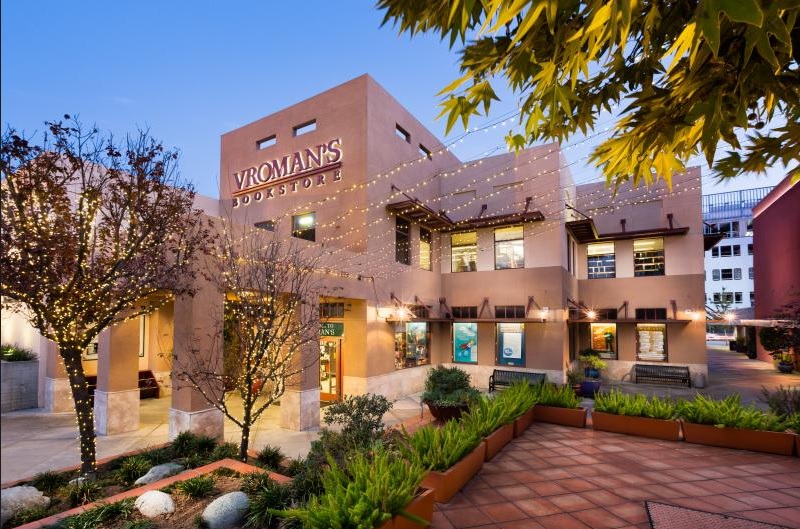 Sales at Vroman's Bookstore, Pasadena, Calif., are down 40% this year, "a level which cannot sustain our business," chairman Joel Sheldon wrote in a letter to customers quoted in Pasadena Now. "The next few months will determine the future of Vroman's." Vroman's also owns Book Soup in West Hollywood.
Sales at Vroman's Bookstore, Pasadena, Calif., are down 40% this year, "a level which cannot sustain our business," chairman Joel Sheldon wrote in a letter to customers quoted in Pasadena Now. "The next few months will determine the future of Vroman's." Vroman's also owns Book Soup in West Hollywood.









_%E2%80%A2_Instagram_photos_and_videos.jpg)

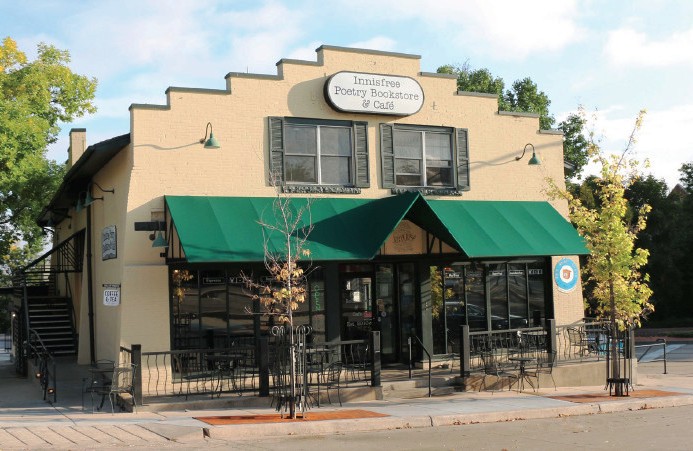

 Scott Abel, co-owner of
Scott Abel, co-owner of 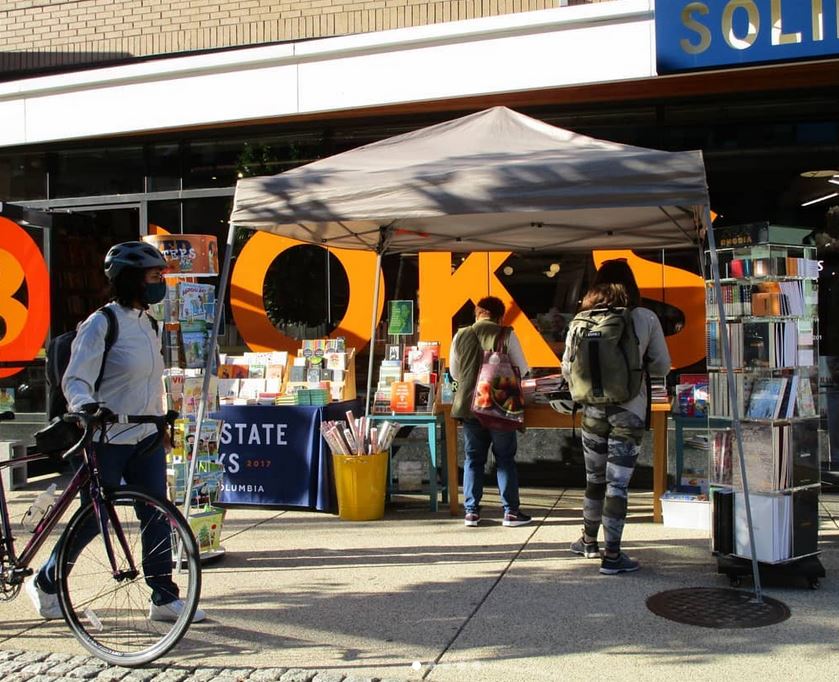
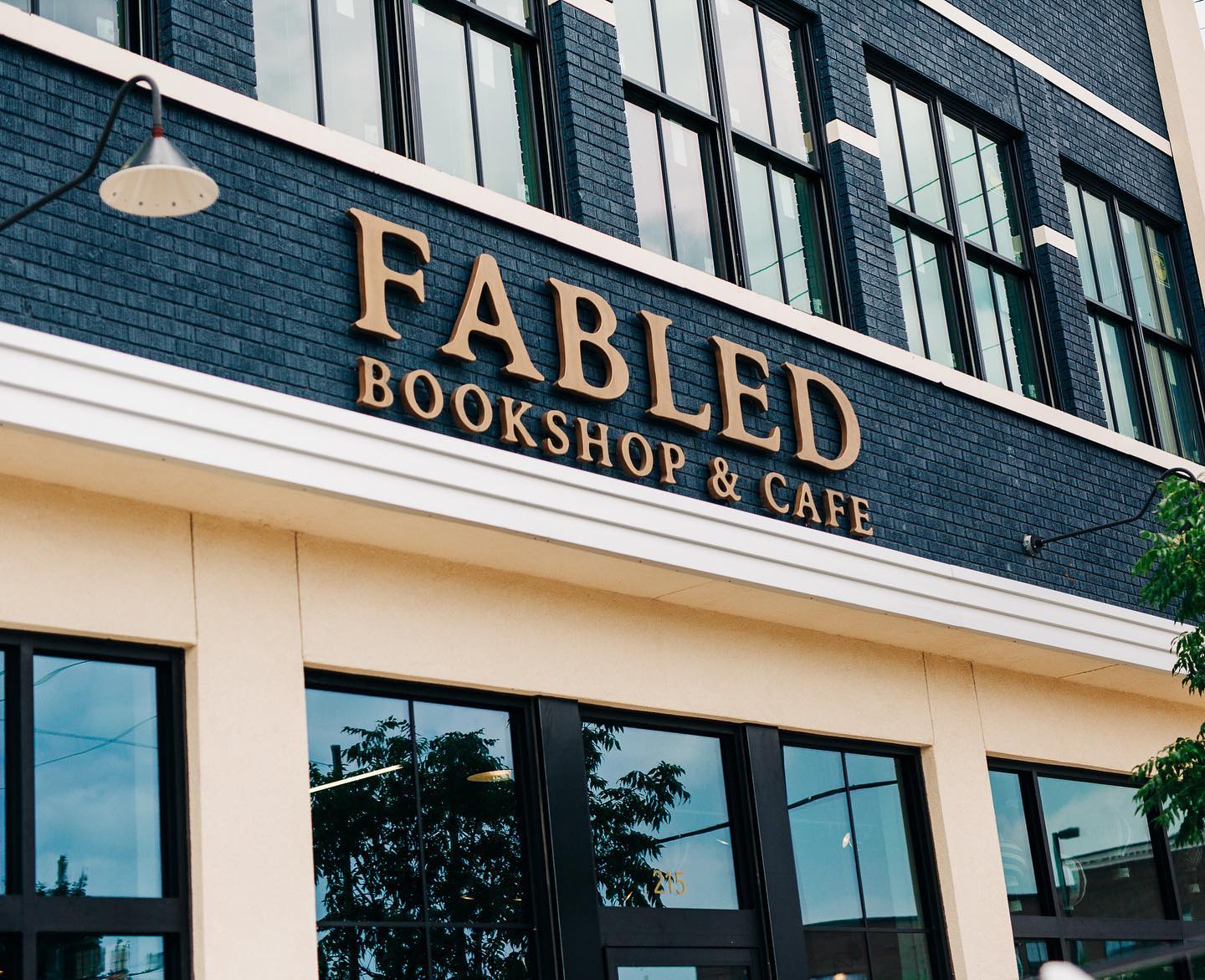 In Waco, Tex.,
In Waco, Tex., 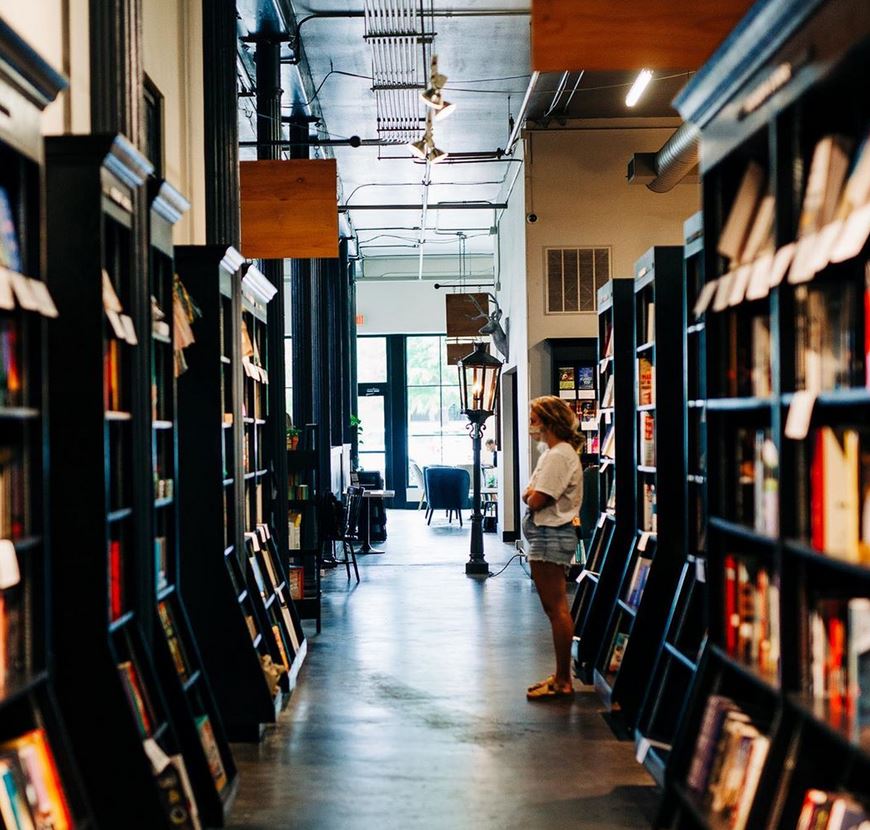 The Fabled Bookshop team has added floor stickers for social distancing, reminders to wear masks, hand sanitizer stations throughout the shop and removed some of the cafe seating to allow for extra space. Fortunately, Frenzel continued, almost all of the store's customers have complied with the state's mask order. If anyone refuses to wear one, the staff reminds them that Fabled also offers curbside service and shipping anywhere.
The Fabled Bookshop team has added floor stickers for social distancing, reminders to wear masks, hand sanitizer stations throughout the shop and removed some of the cafe seating to allow for extra space. Fortunately, Frenzel continued, almost all of the store's customers have complied with the state's mask order. If anyone refuses to wear one, the staff reminds them that Fabled also offers curbside service and shipping anywhere. The closing program for
The closing program for  Patchett asked, "How are you getting creatively through crisis?" Doyle replied, "My event with Ann during my book launch was my very last book tour event. I went from this time when I was supposed to be launching this big thing in the world, to Covid. I remember my sister bawling and saying, 'what we can do?' And I said, 'We can do service.' Now I'm doing everything in my power to affect the election. Today, we launched '
Patchett asked, "How are you getting creatively through crisis?" Doyle replied, "My event with Ann during my book launch was my very last book tour event. I went from this time when I was supposed to be launching this big thing in the world, to Covid. I remember my sister bawling and saying, 'what we can do?' And I said, 'We can do service.' Now I'm doing everything in my power to affect the election. Today, we launched '
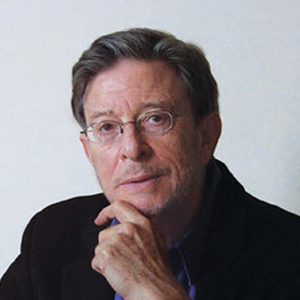
 "How do you know you've arrived at the Uncommon Open Air weekend? You see the
"How do you know you've arrived at the Uncommon Open Air weekend? You see the 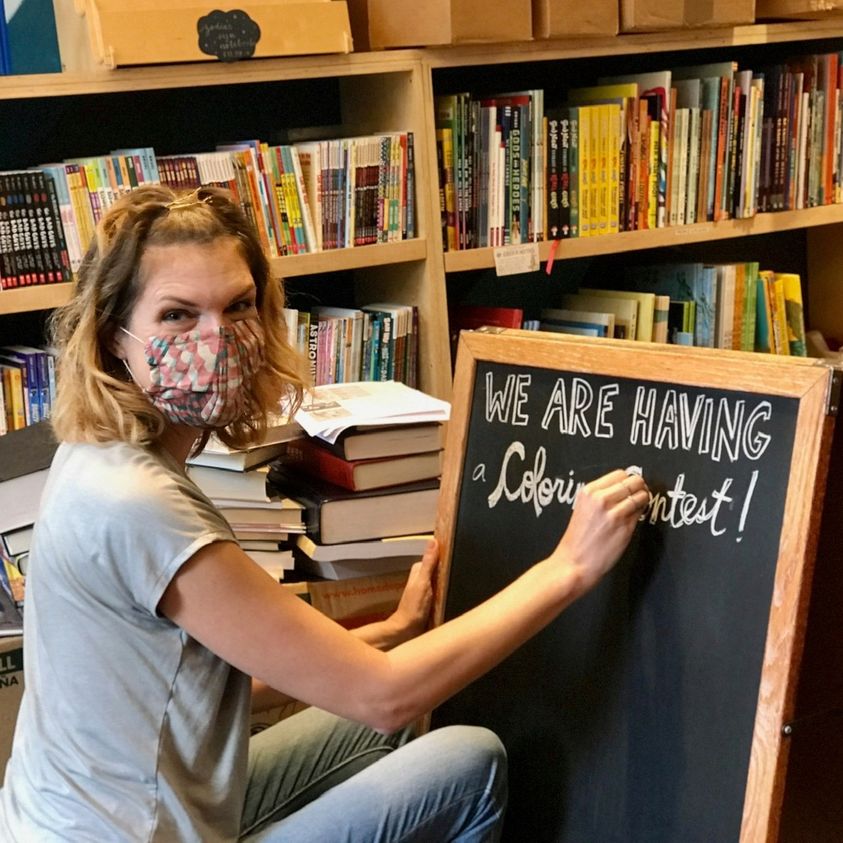 "Some tasks in particular make me feel like I'm
"Some tasks in particular make me feel like I'm 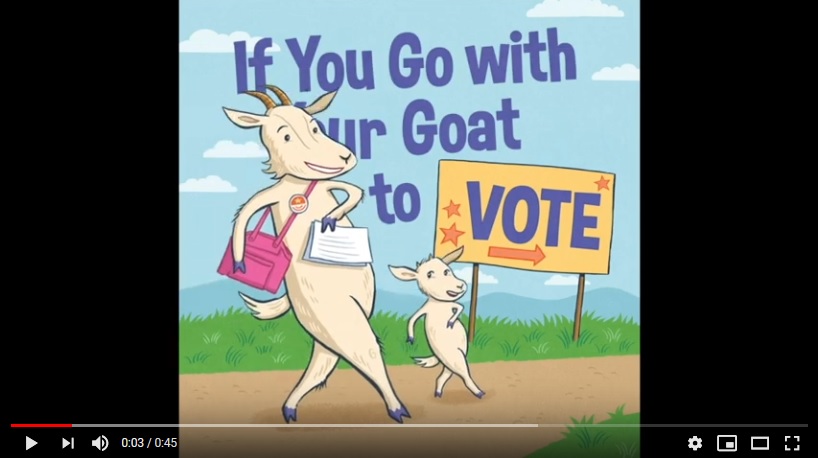 If You Go with Your Goat to Vote
If You Go with Your Goat to Vote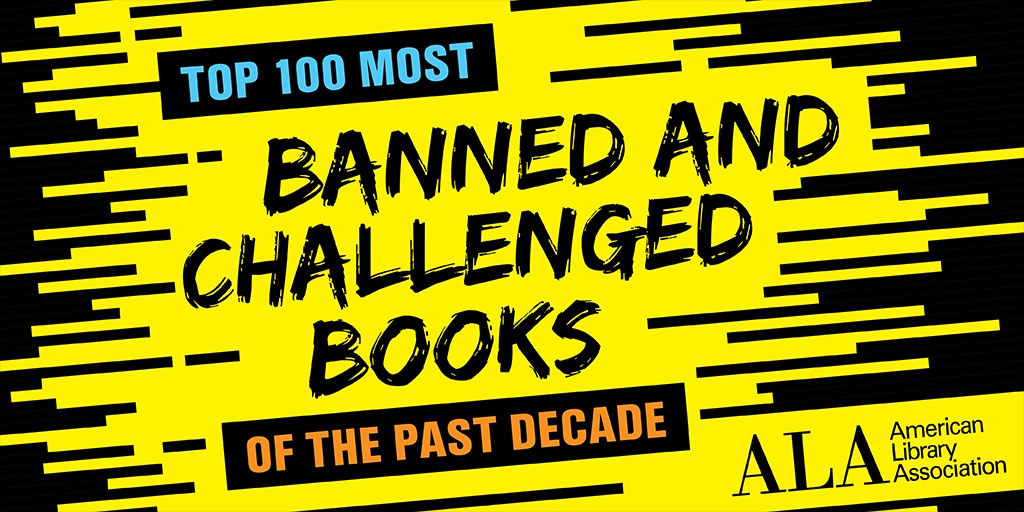 To help launch Banned Books Week, the American Library Association's Office for Intellectual Freedom has released a list of the
To help launch Banned Books Week, the American Library Association's Office for Intellectual Freedom has released a list of the 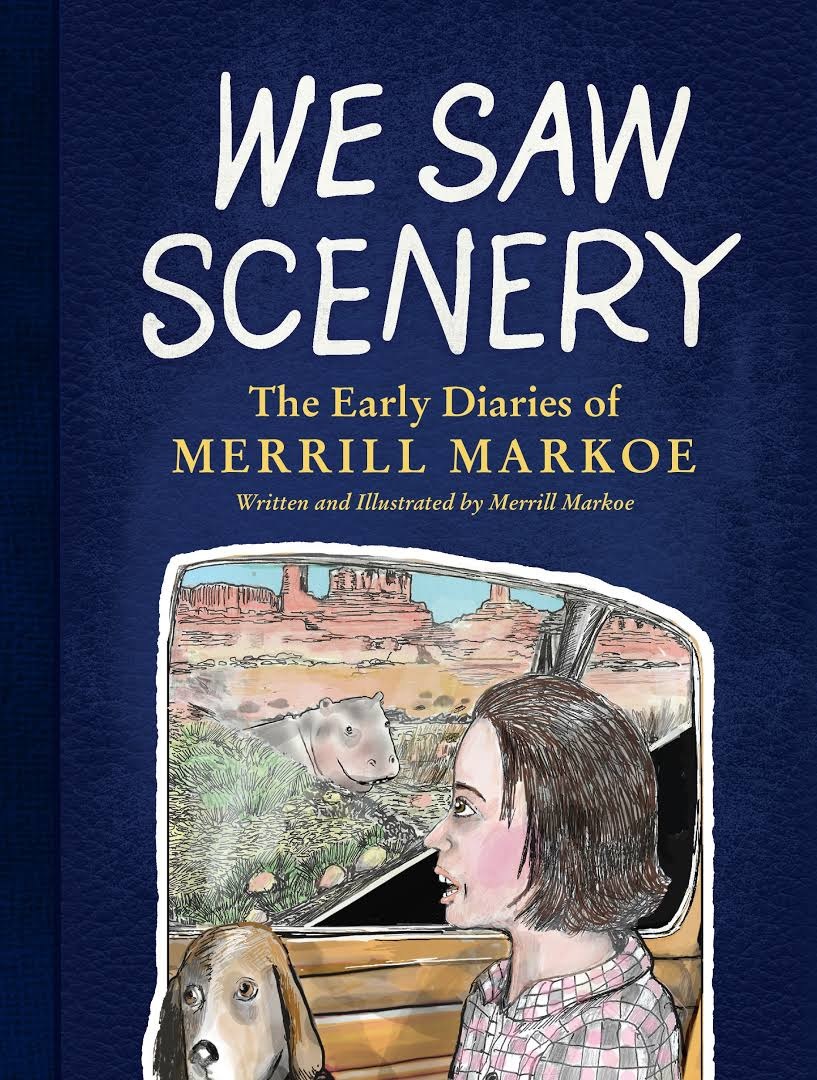 A book full of an author's poignant childhood diary entries sounds like a vanity project; blessedly, We Saw Scenery: The Early Diaries of Merrill Markoe is not that. The multiple Emmy Award-winning comedy writer has augmented some of her youthful jottings with drawings and snappy, bewildered and trenchant present-day observations, and the result is a marvelously oddball coming-of-age memoir with laughs and a talking hippo.
A book full of an author's poignant childhood diary entries sounds like a vanity project; blessedly, We Saw Scenery: The Early Diaries of Merrill Markoe is not that. The multiple Emmy Award-winning comedy writer has augmented some of her youthful jottings with drawings and snappy, bewildered and trenchant present-day observations, and the result is a marvelously oddball coming-of-age memoir with laughs and a talking hippo.